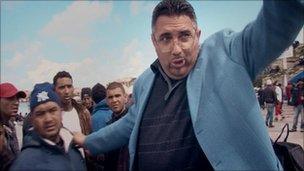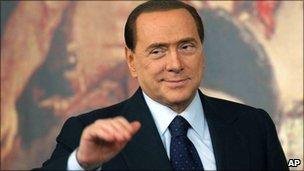Italy's Lampedusa left in crisis after Arab Spring
- Published
In the wake of uprisings across North Africa, one tiny Italian island has become the front line for migrants seeking a better life in Europe. And its residents have been in open revolt.
Lampedusa's mayor is Bernardino de Rubeis, but everyone knows him as Dino. Standing at almost seven feet tall, he is a familiar figure around town, but even his broad shoulders are struggling to deal with the largest influx of migrants the island has ever seen.
"We have a long history of welcoming migrants in Lampedusa - we are a welcoming people. But it's enormously difficult to deal with a humanitarian emergency like this," he said.
Although part of Italy, the island is actually closer to North Africa than it is to Europe. EU leaders had done deals with both Tunisia and Libya to control the flow of migrants arriving in Europe.
But with the collapse of the Tunisian regime, and the Libyan conflict, those agreements are in tatters, and now tens of thousands of migrants are setting off to seek a better life overseas.
The UN estimates that this year alone around 1,500 have died trying to make the crossing. For those that do make it, Lampedusa is their first port of call.
When the weather is good on the 70 mile stretch of water between North Africa and Lampedusa, the island has seen the arrival of up to 10 boats a day bringing in over 1,000 migrants.
Sleeping rough
In the past, migrants have been flown quickly off the island to be processed at detention centres in mainland Italy. But within weeks of the uprisings across the water in North Africa, those centres became full, and a backlog built up on Lampedusa.
The small detention centre on the island was designed to provide temporary accommodation for 850 migrants, but by early March it was overflowing with over 2,000.

Lampedusa's mayor Bernardino de Rubeis is worried the island will not survive without tourists
Lampedusa's population of just under 6,000 survives on the annual influx of wealthy tourists from Italy and abroad, drawn to its remote coves and beaches, and its sleepy portside town.
Stella Migliosini depends on tourists to visit her jewellery shops during the busy summer months.
"As a port in the Mediterranean, Lampedusa has always been a transit point for immigrants - we've always been welcoming, giving them what we can, blankets, food. But what we've seen this year is very different," she said.
As Lampedusa's centre began to overflow, improvised camps, with shelters made of bin bags and plastic sheets sprang up in the hills above the harbour.
Hundreds of young immigrants took up residence in the handful of bars and cafes in town, sometimes begging for food, money or cigarettes.
Harbour blockades
Lampedusians became divided on how to respond. While some rallied round to provide clothes and a hot shower in the local church, many others began a series of passionate demonstrations, demanding that the Italian government and the EU immediately remove the migrants, or at least get them out of sight.
Dino the mayor found himself treading a fine line between giving humanitarian assistance to migrants and quelling the fears of the islanders that Lampedusa's tourist economy may be ruined.
"TV cameras are showing Lampedusa to the world, but the world needs to understand that Lampedusa is not just about migrants, but is an island for tourists. I cannot let a humanitarian crisis destroy the island," he said.
Other islanders were far less diplomatic. Mobs started gathering at the portside to try and blockade migrant boats from landing. And when an angry crowd successfully turned one boat back (for the first time in Lampedusa's history), the Italian coastguard was forced to create a landing area behind a line of armed police.
Local lawyer Paola la Rosa is convinced that Prime Minister Silvio Berlusconi deliberately turned a blind eye to Lampedusa's problems. She believes images of a small Italian town overrun with migrants may actually win support for Berlusconi's anti-immigration policies.
"It's true that thousands of migrants have arrived, but this number is nothing - the population of Italy is 60 million. And these people don't even want to stay in Italy. But if you keep them in Lampedusa then you have a huge problem," she said.
The migrants also felt frustrated. "Two hundred and fifty thousand Libyans crossed into Tunisia and were looked after in camps. Why can't Italy look after a few thousand of us?" a young Tunisian called Yusuf asked.
Border politics

Mr Berlusconi flew to Lampedusa in late March and promised to move the migrants to the mainland
The arrival of the migrants has also created problems at the heart of Europe. Mr Berlusconi put pressure on both the EU and French Prime Minister Nicolas Sarkozy to help deal with Italy's migrants, but Mr Sarkozy responded by temporarily closing France's border with Italy to Tunisians who wanted to come in.
This called into question one of the founding principles of the European Union - the free movement of people across borders, known as the Schengen Agreement.
Seeing what was happening in France and Italy, Denmark also closed its internal borders - an act which the EU Commission President Jose Manuel Barroso has declared may be a violation of European law.
With financial worries across the eurozone and a rise in support for far-right, anti-immigration parties, many European leaders are winning support by dropping hints that border controls may return.
A week before the opening of his trial for soliciting prostitution with a minor and for misuse of power, Mr Berlusconi flew to Lampedusa and made a brief speech.
Along with a string of promises to buy a house in Lampedusa, build a golf course and plant trees (he has not yet done any of these), he did promise to send large ships to remove migrants to the mainland.
Within five days nearly all the Tunisians had been moved on, and the few that remained were moved to the immigration centre and away from the town.
Today, a ship is always waiting off the shores of Lampedusa, ready to move the immigrants when their numbers get too high.
Mr Berlusconi has also done a deal with authorities in Tunisia to start repatriating 60 Tunisians a day, which in turn seems to have acted as a deterrent to young men wanting to make the journey.
But bigger problems lie ahead. While the number of Tunisians arriving on Lampedusa has been decreasing, Libyan and sub-Saharan refugees are now coming in far bigger boats, and in increasing numbers.
Lampedusa businesswoman Stella Migliosini feels Italy should send the migrants back to where they came from. "We should shut our borders like France did - this cannot continue."
Paola la Rosa feels the problem is bigger than just controlling borders. "Europe and the West got really enthusiastic about revolutionary movements seeking freedom in Arab countries," she said.
"But one of the freedoms these people want is the freedom to move, the freedom to seek a better life elsewhere. The West doesn't like that so much. They want them to be free, but at home."
"We will continue welcoming people here in Lampedusa," said Dino the mayor. "But Europe must do the same."
This World: The Invasion of Lampedusa will be broadcast on Tuesday 14 June on BBC Two at 1900 BST or watch online (UK only) for 7 days afterwards via iPlayer at the above link.
- Published19 May 2011
- Published30 March 2011
- Published8 May 2011